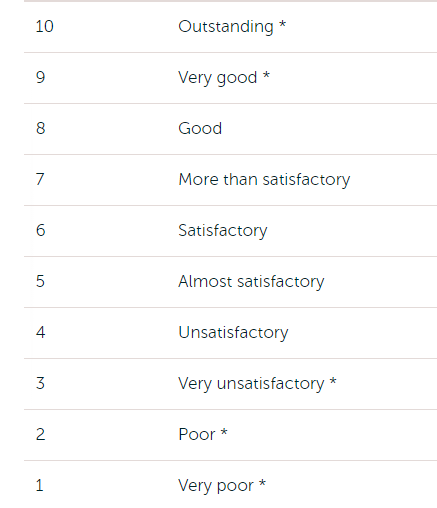Academic Structure & Grading System
Dutch academic and grading system
So, let’s talk a little bit about how the academic system works at TU Delft. Here, the academic year is divided in to four quarters. Each quarter the students take a small number of classes in most cases. These classes are often two general classes and one class for your track. We use the online environment Brightspace to assist with the classes. Brightspace is used to enroll to classes, reach class documents such as lecture slides, suggested literature, assignments and project deliverables. Additionally, the announcements regarding the class can be found on Brightspace as well.
At the end of each quarter, each class has its final deliverables such as projects, case studies, essays, or exams. More often than not, classes have a project and an exam as final deliverables. These projects often are group projects aimed for the student to combine all of the theory they have learned thorough the class in a comprehensive matter.
The grading system here is on a scale from 0 to 10. Even though each class is different, often a final grade of 5.75 is needed from each deliverable to pass any given class. This means that if there is a project and an exam for a class, you need to score at least 5.75 from both of them separately. In case you score below the passing grade, you have the opportunity to retake the exam or project you need to pass, in the coming quarter. However, if you are unable to get a passing grade from the retake exam, you need to wait until next year to take the exams again. But hopefully, you will not have to worry about this!

Culture of academic life
As every country and nation has developed a unique culture during their long-lasting histories, we can argue the same for universities, faculties and even master programs. Each has its own culture, style and way of doing things. As international students, we are likely to distinguish differences with our outsider look. I would like to interest you with a few highlights that I found different from my previous studies.
- Lots of feedback. You are always provided with feedback by either the lecturer or teaching assistants even for small assignments or tasks. If not enough, you can always ask for more.
- Checkpoints on the way. The program is designed to support you and make you accomplish at the end; it is not against you. Even though you have to deal with a considerable workload there are always checkpoints and guidance to keep you on the right way.
- Approachable staff. You are entering into a family with different customs and cultures, and most naturally, you may be lost about what you are expected. Responsible staff for the course are quite responsive, kind and approachable as long as you let them know.
- Application of theory. You are not left with the theory and concepts only. Courses always involve the implementation of what you have learnt. So, you may find yourself at a negotiation table while representing a farmer community for a district heating discussion or modelling the emergency response process of the city of Turin.
- Thriving for teamwork. Sometimes you start forgetting how many group projects you were in. If you are born a natural team player, it is the place to shine. If not, you will get there in no time!
- Bonus: Master is not a plus, but a must. Having a master’s degree may be seen as something extra in other countries, but it is the almost bare minimum in the Netherlands. Most students here see it as a continuum of their bachelor’s degree. Also, most companies list it as a requirement for their openings.